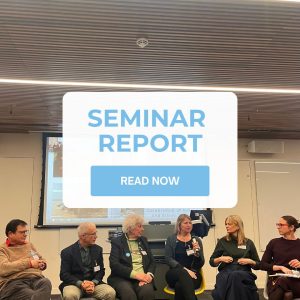Celebrating 35 Years of Inform and Eileen Barker
On 13th January 2024, we held an Anniversary Seminar to celebrate 35 years of Inform and Professor Eileen Barker. This was a very successful event with around 70 attendees. There were panels of participants who had collaborated with Inform in different ways over its history including members/ex-members; academics; and other professionals.
“The Making of a Moonie will always stand as one of the primary books in new religions and in the sociology of religion… but the real significance of Eileen is, throughout her lengthy career – of more than 40 years now – there stands a body of material of great contributions to the whole field of new religious movement scholarship.”
“I would love both Inform and Eileen to continue for as long as possible. All of us as individuals are much better for their presence.”
“Eileen’s founding of Inform is a major contribution to the unbiased research into new religious movements. Making that information available to members of the general public and various institutions is a very important job.”
“Meeting Eileen in the very earliest days of my time at LSE was like encountering an intellectual typhoon. Eileen was – and remains! – a creative and activist scholar whose charm and energy soon whisked me into her world of cults, giving me immense academic satisfaction and also (as a Board but never bored member) lots to do to help keep her ever-precarious but always thriving Inform on the road. We have missed her since she crossed the road in 2017 –King’s gain is definitely LSE’s loss. Best wishes Eileen for the next 35 years!”
PRE-INFORM: THE CULT WARS
Having been studying new religions and societal responses to them in Europe, North America and various other places around the world since the early 1970s, Eileen Barker had witnessed what seemed to be a considerable amount of unnecessary suffering this applied both to members of the new religions and, possibly even more, to the relatives and friends of those who joined a movement that they didn’t understand. She concluded that although there were always likely to be disagreements, much of the suffering was unnecessary in so far as people were acting on the basis either of ignorance or of misinformation supplied by the movements and/or their opponents.
Considering this, she believed that the work of a growing number of scholars who had conducted rigorous and systematic studies of the new religions, but whose
research tended to be either ignored or derided, ought to be heard.
FOUNDING INFORM: BRINGING THE SOCIOLOGY OF RELIGION TO THE PUBLIC SPACE
Inform was founded Barker at the London School of Economics in 1988. Based on her research with the Unification Church, Barker felt that harm was being caused by both a lack of information and misinformation about what were, at that time, relatively new religious movements to the United Kingdom. Barker’s seminal study is The Making of a Moonie: Brainwashing or Choice? (1984), which won the 1985 Distinguished Book Award from the Society for the Scientific Study of Religion. Her life’s work has been to promote accurate information obtained from social scientific methodology on religion, for which she has received numerous other awards (Beckford and Richardson 2003). Inform’s start-up funding was provided by the UK Home Office and it continues to be supported by a mixture of government and charitable commissions, grants and private donations.
“With the support of the British Home Office and the mainstream churches, in January 1988 I founded an educational charity, called Inform (Information Network Focus on Religious Movements), whose mission was—and remains—that of offering inquirers information that is as reliable, balanced, contextualized, and up-to-date as possible (Barker 2001, 2006)”
– Eileen Barker
INFORM’S IMPACT: ACTING AS A BRIDGE
The early work of Inform focused on the research and provision of accurate information on groups popularly considered ‘cults’ or ‘sects’ (Barker 1989, 2006, 2011). However, moving into the twenty-first century, Inform’s remit has broadened towards providing accurate, contextualized information on a wide range of minority religious and non-religious movements. Inform does not define too precisely the terms ‘minority religions’ and ‘spiritualities’. They are used to provide a common sense starting point to cover what others have called ‘cults’, ‘sects’, ‘new religious movements’, ‘non-conventional religions’, ‘alternative religions’, ‘spiritual movements’, ‘esoteric movements’, and ‘self-religions’. The majority of enquiries received at Inform are, in fact, about new movements within ‘mainstream’ religions (Christianity, Judaism, Islam, Hinduism, Buddhism, and Sikhi traditions).
“There will always be some problems that cannot be solved, but INFORM has a proven track record of having helped to improve numerous difficult and sensitive situations involving thousands of individuals—both directly and indirectly since its inception. INFORM does not have a magic wand, but it is, we believe, worth bringing the sociology of religion into the public space.”
– Eileen Barker
PRE-INFORM: THE CULT WARS
Having been studying new religions and societal responses to them in Europe, North America and various other places around the world since the early 1970s, Eileen Barker had witnessed what seemed to be a considerable amount of unnecessary suffering. This applied both to members of the new religions and, possibly even more, to the relatives and friends of those who joined a movement that they didn’t understand. She concluded that although there were always likely to be disagreements, much of the suffering was unnecessary in so far as people were acting on the basis either of ignorance or of misinformation supplied by the movements and/or their opponents.
Considering this, she believed that the work of a growing number of scholars who had conducted rigorous and systematic studies of the new religions, but whose research tended to be either ignored or derided, ought to be heard.
FOUNDING INFORM: BRINGING THE SOCIOLOGY OF RELIGION TO THE PUBLIC SPACE
Inform was founded by Barker at the London School of Economics in 1988. Based on her research with the Unification Church, Barker felt that harm was being caused by both a lack of information and misinformation about what were, at that time, relatively new religious movements to the United Kingdom. Barker’s seminal study is The Making of a Moonie: Brainwashing or Choice? (1984), which won the 1985 Distinguished Book Award from the Society for the Scientific Study of Religion. Her life’s work has been to promote accurate information obtained from social scientific methodology on religion, for which she has received numerous other awards (Beckford and Richardson 2003). Inform’s start-up funding was provided by the UK Home Office and it continues to be supported by a mixture of government and charitable commissions, grants and private donations.
“With the support of the British Home Office and the mainstream churches, in January 1988 I founded an educational charity, called Inform (Information Network Focus on Religious Movements), whose mission was—and remains—that of offering inquirers information that is as reliable, balanced, contextualised, and up-to-date as possible (Barker 2001, 2006).”
INFORM’S IMPACT: ACTING AS A BRIDGE
The early work of Inform focused on the research and provision of accurate information on groups popularly considered ‘cults’ or ‘sects’ (Barker 1989, 2006, 2011). However, moving into the twenty-first century, Inform’s remit has broadened towards providing accurate, contextualised information on a wide range of minority religious and non-religious movements. Inform does not define too narrowly the terms ‘minority religions’ and ‘spiritualities’. They are used to provide a common sense starting point to cover what others have called ‘cults’, ‘sects’, ‘new religious movements’, ‘non-conventional religions’, ‘alternative religions’, ‘spiritual movements’, ‘esoteric movements’, and ‘self-religions’. The majority of enquiries received at Inform are, in fact, about new movements within ‘mainstream’ religions (Christianity, Judaism, Islam, Hinduism, Buddhism, and Sikh traditions).
“There will always be some problems that cannot be solved, but INFORM has a proven track record of having helped to improve numerous difficult and sensitive situations involving thousands of individuals—both directly and indirectly since its inception. INFORM does not have a magic wand, but it is, we believe, worth bringing the sociology of religion into the public space.” – Eileen Barker
“It’s difficult to applaud INFORM without becoming personal.
As a cult ‘survivor’ (and I still can’t find a better word!) the ‘idea’ of an organisation that actually listened, wanted to know and understood ‘being in a cult’, was a marvel – signposts through the maze of confusion, fear and guilt. Meeting Suzanne Newcombe was like arriving at an oasis – she shared practical and astute insights delivered with an intelligence and compassion I have never found in such an astonishing combination elsewhere. I have always trusted INFORM’s confidentiality. I don’t trust easily, at all. But the views and behaviour of everyone I have known who has worked at INFORM has been truly friendly, open, kind and fiercely what INFORM pertains to be – informative. Out of the wilds of cult recovery into a panorama of possibility. I am not insane. I am not unusual. I am, simply, getting out of a cult, and it takes a long, long time if you have been really ‘in’. The INFORM tribe knows this. It’s not an easy academic area to say the least! So I am deeply grateful for fifteen years of support – to publish about my ex cult – to be there when I have questions – and I don’t know anywhere else they could be answered.
I have been encouraging others to hopefully open the INFORM door too. I feel they won’t regret it, but they might as INFORM sometimes takes some explaining – no, they can’t house you, or get you therapy, but they can help people understand exactly what you were dealing with, are dealing with, and liaise with the media, with institutions who are more likely to believe an INFORM researcher than a ‘simple’ survivor. That’s their magic and their integrity; their charm and what makes up the absolute need for INFORM to continue to exist in this unstable, difficult world.
Thank you. Thank you. Always.”
Carol McQuire, Writer – Anthropologist – Musician – Tutor – Artist
The Making of a Moonie Interview 1999
Interview discussing Barker’s groundbreaking 1984 text ‘The Making of a Moonie: Brainwashing or Choice?’.
Gearty Grilling: Eileen Barker on Cults
Eileen Barker, Emeritus Professor of Sociology, discusses accusations that she is a “cult apologist.”
CenSAMM Conference Roundtable
David Robertson of the Religious Studies Project hosts a roundtable discussion with Eileen Barker, Tristan Sturm, Moojan Momen and Joe Webster on the subject of “Violence and Millenarian Movements”.
Additional Information
Eileen Barker YouTube Playlist
Articles about Eileen Barker
Articles about Inform
Barker, E., 2001. INFORM: Bringing the Sociology of Religion to the Public Sphere. In P. Côté (Ed.), Chercheurs de dieux dans l’espace public – Frontier Religions in Public Space (pp. 21–34). University of Ottawa Press. http://www.jstor.org/stable/j.ctt1ckpcj1.7
Selected List of Articles and Books by Eileen Barker
2017. “From Cult Wars to Constructive Cooperation – Well, Sometimes” in Eugene V. Gallagher (editor) The ‘Cult Wars’ in Historical Perspective. Abingdon and New York: Routledge. 9-22.
2014. “The Not-So-New Religious Movements: Changes in ‘the Cult Scene’ over the Past Forty Years.” Temenos Vol. 50 No. 2 (2014), 235–56. https://journal.fi/temenos/article/view/48461/14189
2012. “Ageing in New Religions: The Varieties of Later Experiences.” Diskus: The Journal of the British Association for the Study of Religions 12. Available as a PDF here.
2011. “Religion in China: Some Introductory Notes for the Intrepid Western Scholar.” Pp. 109-32 in Social Scientific Studies of Religion in China: Methodology, Theories, and Findings, edited by Fenggang Yang and Graeme Lang. Leiden & Boston: Brill. Available as PDF here.
2009. “In God’s Name: Practising Unconditional Love to the Death.” Pp. 49-58 in Dying for Faith: Religiously Motivated Violence in the Contemporary World, edited by Madawi Al-Rasheed and Marat Shterin. London & New York: I.B.Tauris. Available as a PDF here.
2008. The Centrality of Religion in Social Life: Essays in Honour of James A. Beckford. (Editor). Aldershot: Ashgate. ISBN 978-0-7546-6515 1
2005. “Crossing the Boundary: New Challenges to Authority and Control as a Consequence of Access to the Internet.” Pp. 67-85 in Religion and Cyberspace, edited by Morten Thomsen Højsgaard and Margit Warburg. London: Routledge. Available as a PDF here.
2001. “A general overview of the “cult scene” in Britain.” Nova Religio, 4 (2). 235-240.https://doi.org/10.1525/nr.2001.4.2.235
1995. “The Scientific Study of Religion? You Must be Joking!” Journal for the Scientific Study of Religion, Vol.34 no.3, 1995: 287-310. https://doi.org/10.2307/1386880
1994 The Making of a Moonie: Brainwashing or Choice? Aldershot: Ashgate ISBN 0 7512 0136 7. [first published Blackwell (Oxford) 1984].
1989. New Religious Movements: A Practical Introduction. London: HMSO. TSO Shop
1982. New Religious Movements: A Perspective for Understanding Society. (Editor). New York: Edwin Mellen Press. ISBN 0-11-340927-3.


